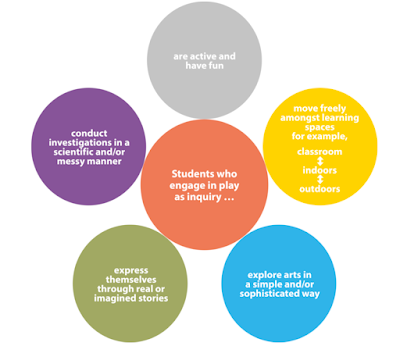In recent years there has been more and more emphasis on play in the Early Years setting. Play is important because it is inquiry in the truest sense. It is student-initiated and it involves freedom and choice and therefore builds agency and develops skills. It is through play that children move from dependence to independence through building their self-regulation. Because of this, Early Years students need extended time for play, and the adults should use this time to monitor and document the learning through inquiry that they observe happening.
There is a multitude of research that points to the development of skills through play, as both cognitive processes and social engagement are activated. These skills include language, symbolic exploration and expression, literacy and numeracy, all vital for any future learning. See the diagram below from The Early Years in the PYP publication.

I've visited a number of Early Years settings recently and it has been a real joy to see how these flexible spaces have enabled students to make independent choices about where, what and how they will learn. In the UK schools I've visited this is known as "continuous provision" and it describes all the areas that the children use each day. In each area there is a range of resources that are available to students all of the time to encourage them to learn skills while at the same time challenging their thinking and helping them to embed concepts. The adults observe the children and use what they notice to engage in questioning and learning conversations with the students. I was interested to read that continuous provision actually goes deeper than provision that is continually accessible - it also involves the selection of resources that continue the provision for learning in the absence of an adult.

No comments:
Post a Comment